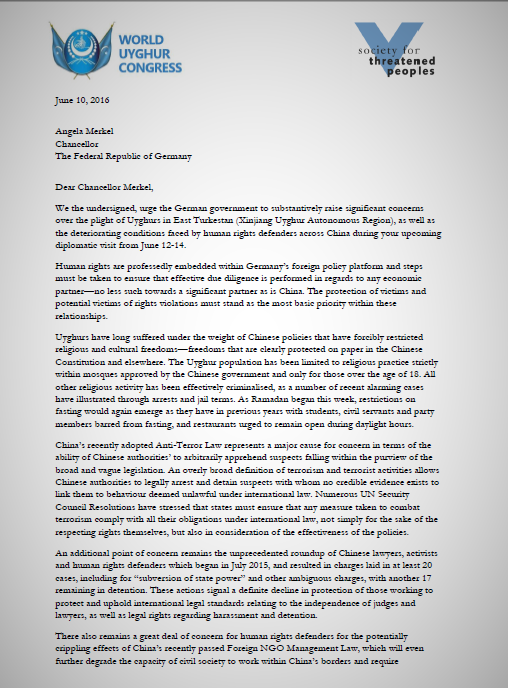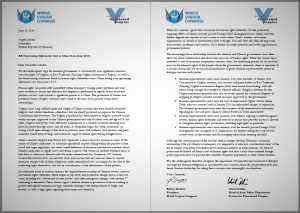Open Letter to Angela Merkel Ahead of Visit to China

For immediate release
10 June 2016
Contact: World Uyghur Congress www.uyghurcongress.org
0049 (0) 89 5432 1999 or [email protected]
 Ahead of German Chancellor Angel Merkel’s upcoming diplomatic and trade visit to China from June 12-14, the World Uyghur Congress and the Society for Threatened Peoples has written an open letter urging the German government to substantively raise issues from restrictions on religious practice during Ramadan, Ilham Tohti’s continued detention, and the recent mistreatment and crackdown on lawyers, human rights defenders and activists. The text and PDF versions of the letter can be found below:
Ahead of German Chancellor Angel Merkel’s upcoming diplomatic and trade visit to China from June 12-14, the World Uyghur Congress and the Society for Threatened Peoples has written an open letter urging the German government to substantively raise issues from restrictions on religious practice during Ramadan, Ilham Tohti’s continued detention, and the recent mistreatment and crackdown on lawyers, human rights defenders and activists. The text and PDF versions of the letter can be found below:
June 10, 2016
Angela Merkel
Chancellor
The Federal Republic of Germany
RE: Upcoming diplomatic visit to China from June 12-14
Dear Chancellor Merkel,
We the undersigned, urge the German government to substantively raise significant concerns over the plight of Uyghurs in East Turkestan (Xinjiang Uyghur Autonomous Region), as well as the deteriorating conditions faced by human rights defenders across China during your upcoming diplomatic visit from June 12-14.
Human rights are professedly embedded within Germany’s foreign policy platform and steps must be taken to ensure that effective due diligence is performed in regards to any economic partner—no less such towards a significant partner as is China. The protection of victims and potential victims of rights violations must stand as the most basic priority within these relationships.
Uyghurs have long suffered under the weight of Chinese policies that have forcibly restricted religious and cultural freedoms—freedoms that are clearly protected on paper in the Chinese Constitution and elsewhere. The Uyghur population has been limited to religious practice strictly within mosques approved by the Chinese government and only for those over the age of 18. All other religious activity has been effectively criminalised, as a number of recent alarming cases have illustrated through arrests and jail terms. As Ramadan began this week, restrictions on fasting would again emerge as they have in previous years with students, civil servants and party members barred from fasting, and restaurants urged to remain open during daylight hours.
China’s recently adopted Anti-Terror Law represents a major cause for concern in terms of the ability of Chinese authorities’ to arbitrarily apprehend suspects falling within the purview of the broad and vague legislation. An overly broad definition of terrorism and terrorist activities allows Chinese authorities to legally arrest and detain suspects with whom no credible evidence exists to link them to behaviour deemed unlawful under international law. Numerous UN Security Council Resolutions have stressed that states must ensure that any measure taken to combat terrorism comply with all their obligations under international law, not simply for the sake of the respecting rights themselves, but also in consideration of the effectiveness of the policies.
An additional point of concern remains the unprecedented roundup of Chinese lawyers, activists and human rights defenders which began in July 2015, and resulted in charges laid in at least 20 cases, including for “subversion of state power” and other ambiguous charges, with another 17 remaining in detention. These actions signal a definite decline in protection of those working to protect and uphold international legal standards relating to the independence of judges and lawyers, as well as legal rights regarding harassment and detention.
There also remains a great deal of concern for human rights defenders for the potentially crippling effects of China’s recently passed Foreign NGO Management Law, which will even further degrade the capacity of civil society to work within China’s borders and require
organizations to submit to unrestricted police oversight. Not only does this chill existing work from lawyers, academics and activists, but it further dissuades peaceful and lawful opposition to government policies.
The increasingly close relationship between the German and Chinese governments must then allow for closer collaboration and discussion on issues of human rights. While the current trip is intended as one of economic cooperation between states, the underlying priority for all involved must be the inherent rights of the people whom the governments ultimately claim to represent. It is for this reason that we set out recommendations to guide German representatives ahead of dialogue between both parties:
- German representatives must raise concerns over clear breaches of China’s own Constitution as Uyghur students, civil servants and party leaders in East Turkestan (Xinjiang Uyghur Autonomous Region) have been barred from fasting, with still others being strongly discouraged by Chinese officials. Religious freedom for the Uyghur population generally must also be raised, namely the continued illegality of engaging in religious practice outside mosques approved by the government.
- German representatives must raise the case of imprisoned Uyghur scholar, Ilham Tohti, who was arrested back in January 2014 on unfounded charges of separatism. The German government must echo the concerns of the international community regarding his case and press China to release Professor Tohti immediately.
- German representatives must raise concerns over China’s ongoing crackdown against lawyers, human rights defenders and activists to ensure that peaceful dissent is allowed to strengthen human rights protections, including legal rights in particular.
- German representatives must raise concerns over the recently passed Foreign NGO Management Law in regards to its implications for further stifling the work of civil society actors in the country and discouraging others from entering the field.
Although the stated purpose of the visit has been to further develop Germany’s economic relationship with our Chinese counterparts, it is imperative to take into consideration many of the harsh realities very often overshadowed by economic interests in trade relations. No field of policy may be fenced off from issues of human rights and thus a truly value-oriented foreign policy approach must be pursued that considers domestic populations as their central element.
We, the undersigned, therefore recognize the importance of respectful and constructive dialogue and urge the German delegation to substantively raise concerns from the people themselves and thank German leadership for taking these concerns into meaningful consideration.
Yours Sincerely,
Rebiya Kadeer, President
World Uyghur Congress
Ulrich Delius, Head of Asia/Africa Department
Society for Threatened Peoples

